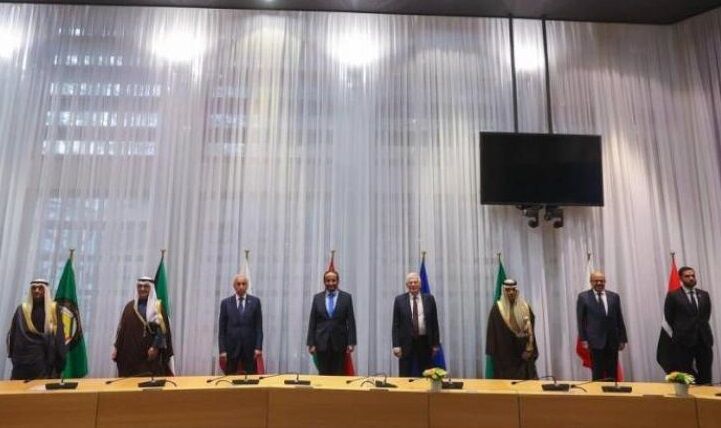Arash Saffaar in an interview with the site of Strategic Council on Foreign Relations pointed out to signing of the Joint Communication on the EU Strategic Partnership with the Persian Gulf Cooperation Council and noted:” the Joint Communication covers a wide range of issues such as stability and security in the region, energy security in global market, cultural cooperation in scientific and exchange of students fields, and the green energies. What boosts the importance of the Joint Communication is its coincidence with some international developments through which we witness the expansion of ties of the Persian Gulf Cooperation Council countries with China, Russia and consequences of Ukraine war”.
Europe’s Concerns about the expansion of Relations of the Persian Gulf Countries with China and Russia
Having stated that signing of the Joint Communication is the reflection of the EU leaders’ concern about the expansion of ties among countries of the Persian Gulf Cooperation Council with China and particularly Russia at present junction, he continued:” the countries of the PGCC already had extensive relations with Europe and although the ties may boost but it can not be said that from now on, new areas in their relations will be established in the light of the said Joint Communication”.
Having referred to the trade volume of Europe with PGCC countries, the analyst of the West Asia Affairs said:” the EU Representation Office was opened in Qatar several years ago. It is possible that within the coming months, another similar office will be opened in Oman. The European Union had also nominated an ambassador to work with the PGCC countries”.
Having stated that the capability to advance such a wide range of topics from both sides is a noticeable issue, he said:” the EU has not revealed any roadmap to translate such issues from words to deeds, and it is not clear that how such a wide range of ambitious objectives are going to go ahead? In the meantime, there are some diverging issues among the PGCC countries and the EU like human rights as well as women rights-related issues”.
Saffaar emphasized:” naturally, such issues can not be discussed in Arab countries of the region and European values too can not be realized within the framework of these talks either and or probable reforms that Europeans expect could be proceeded in these countries”.
The expert of West Asia Affairs commented on the consequences of signing the Joint Communication on Strategic Partnership with Europe and spelled out:” Because of War in Ukraine and in view of the EU sanctions against Russia, the PGCC countries have the potential to supply a part of fossil fuel requirements of Europe. On the other hand, the PGCC countries have an ambitious plan to step towards economies in which carbon use will be sharply decreased and renewable energies will be increased; the EU has some international commitments within the framework of Paris Agreement in this connection. The issue can prepare ground for cooperation”.
He stated in short term, one can not witness a major and remarkable development in relations between the Persian Gulf countries and Europe and or the regional equations originated from the Joint Communication on Strategic Partnership. He said:” in view of the developments at international level and also developments in the region’s security order, the Joint Communication could be of importance in long term and has security consequences in future. In fact, the Joint Communication may prepare a more suitable ground for increased security presence of Europeans in the Persian Gulf region. In view of the interests Europe follows in the region, such presence will create a situation different from what we are witnessing during the U.S. presence”.
Unchanged Strategy of the PGCC in Its Relations with China & Russia
Having commented on the effect of the Joint Communication with the EU and their demands from the leaders of the PGCC countries to distance from China and Russia, the expert of the West Asia Affairs expressed:” It does not seem that the EU could hinder the expansion of relations of the PGCC countries with China and Russia to the extent it expects and makes any change in their long term strategy. EU countries have a certain number of demands and they believe the East can supply them. As long as we witness a dynamic and growing economy in China that can supply the development requirements of the PGCC countries, the inclination will not disappear”.
Saffaar continued:” the PGCC countries have shown that they have such a diplomatic and political capability as well as flexibility that they can coordinate their conflicting interests in relations with the East and the West. Therefore, despite pressures exerted on them by the U.S. and Europe to prevent the expansion of their relations with China and Russia, yet it can not raise a serious impediment. They see the East like the West as a political reality. Having enjoyed with balanced relations with the East and the West offers them to have more diplomatic momentum and greater chance to follow up their interests”.
Having referred to anti-Iranian stances included in the Joint Communication, such as Iran’s peaceful nuclear program and its missile-defensive activities, he said:” although both sides have concerns on these issues, but there are differences in their strategy. The European Union is very much interested in concluding negotiations and achieving an agreement, but the PGCC countries have different outlook towards the negotiations collectively and individually”.










0 Comments